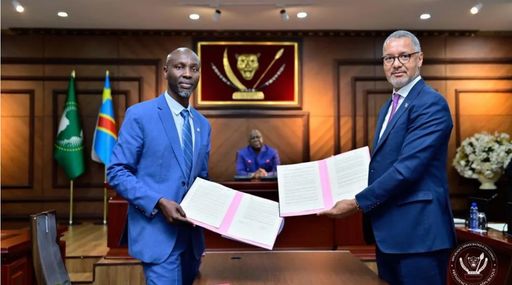The US and Pakistan have signed a memorandum of understanding (MoU) on critical minerals in the South Asian nation, according to a statement from the US Embassy in Islamabad.
Zach Harkenrider, acting deputy chief of the US Embassy in Islamabad, and a delegation from the US Strategic Metals (USSM) signed the MoU with Pakistan's Frontier Works Organisation (FWO) at the Prime Minister's House, according to the statement released on Sunday by the diplomatic mission.
On the signing of the deal, US Charge d’Affaires Natalie Baker called it “yet another example of the strength of the US-Pakistan bilateral relationship that will benefit both countries.”
Stressing the importance of such agreements, Baker said: “The Trump administration has made the forging of such deals a key priority given the importance of critical mineral resources to American security and prosperity. We look forward to seeing future agreements between US companies and their counterparts in the critical minerals and mining sector in Pakistan.”
The statement noted that the Missouri-based USSM is focused on producing and recycling critical minerals, which the US Energy Department has defined as critical in manufacturing and energy production.

US pushback to Chinese dominance
Used in electric vehicles, hard drives, wind turbines and missiles, rare earth elements are essential to the modern economy and national defence.
China accounts for 92 percent of global refined output, according to the International Energy Agency.
"The Middle East has oil. China has rare earths," Deng Xiaoping, the late Chinese leader whose pro-market reforms set the country on its path to becoming an economic powerhouse, said in 1992.
Since then, Beijing's heavy investment in state-owned mining firms and lax environmental regulations compared with other industry players have turned China into the world's top supplier.
But the flow of rare earths from China to manufacturers around the world has slowed after Beijing in early April began requiring domestic exporters to apply for a licence — widely seen as a response to US tariffs.
Under the new requirements — which industry groups have said are complex and slow-moving — seven key elements and related magnets require Beijing's approval to be shipped to foreign buyers.
In response to the pressure, the Trump administration has intensified domestic efforts to build up the critical mineral industry in the United States to work to break the chokehold that China has on the global supply chain.
In late August, US President Donald Trump said that China “intelligently went and they sort of took a monopoly of the world’s magnets,” but he expressed confidence in securing supplies, claiming the US has “much bigger and better cards.”





















